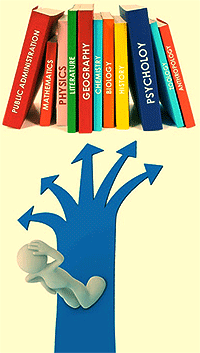How to choose optional subjects for civil services exam
Selecting Right Optional Subject for Civil Services Exam

Through this article, I would like to interact with Civil Services Aspirants about the strategy for the IAS examination.
Friends, the
foremost important thing is the duration of preparing this examination, Ideally
the time to start the preparation is 10-12 months before the exam.
Selecting optional subject is most important part of the
civil services examination which most of the candidates ignore. Generally, "A
college student asks whether I should start preparing when I am studying in
college itself."
Actually; I would suggest them that "Have Civil Services in back of your mind and just start preparing from Daily important news from various news papers like The Hindu, Indian Express, Economic Times, related magazines like Yojana, Kurukshetra, Frontline for in-depth analysis of current issues and events in India & World, and think about selecting your Optional Subject". Optional subjects are those which you have to study for couple of years during your preparation for this exam. So, if you don't like the optional subjects, or if you have selected the subject only for scoring purpose, you won't be comfortable in studying them.
Selection of Right Optional Subject
 Remember, When you select the right optional you are
halfway through in this examination. First before choosing the subject you have
to see the entire syllabuses of the all the optional subjects ranging from subjects like
Agriculture to Russian Literature, there are many optional subjects given by the UPSC. Students must visit
UPSC
official website and see the list of available optional subject and go through the
syllabus. Students with optional subjects as their graduation subjects like
History, Geography or Political Science have the option to choose their
graduation subjects itself as their optional subjects in IAS exam.
Remember, When you select the right optional you are
halfway through in this examination. First before choosing the subject you have
to see the entire syllabuses of the all the optional subjects ranging from subjects like
Agriculture to Russian Literature, there are many optional subjects given by the UPSC. Students must visit
UPSC
official website and see the list of available optional subject and go through the
syllabus. Students with optional subjects as their graduation subjects like
History, Geography or Political Science have the option to choose their
graduation subjects itself as their optional subjects in IAS exam.
For Students with engineering like Mechanical Engineering, Civil Engineering, there are also optional subjects available in UPSC. But they are not most preferred subjects. I am not discouraging students from engineering background to take subjects from their graduation or even Physics, Chemistry which they studied in School and liking. But as I said that the optional subjects like Engineering are not preferred by most of the people and you may loose the option of "Law of Averages". Because other subjects like Sociology, Psychology, Public Administration etcetera are recommended by the most students, which gives and edge over them in writing the Main examination.
So, when you select an optional subject, it is like marrying a person. We have to live with it for few years when you going through the UPSC examination, and during the course of the preparation you should not realise that we should have selected a better optional. So when you select the optional subject, Be Clear & Go Through the Syllabus.
If the syllabus is to your liking, you have to select the subject. Also go through the previous years question papers, and when you feel comfortable with the subject, start reading and analysing NCERT Books related to that subject.
There are many myths about the Civil Services Examination
which I would like to clear here;
First, many students think that lot of intelligence
and intelligence quotient (IQ) is required to clear this exam. But fact is that
"UPSC is looking for very ordinary people who can
understand the pulse of the people in the country.
An Administrator, who can look after the people and implement their development work in a proper way which is comfortable to society, UPSC is not looking for Ph.D. Scientists who are going to work in NASA or Space. So, Intelligence and IQ is not that much necessary. If you look at the list of successful candidates, you will be glad to know that most of the candidates are from rural background with very ordinary schooling and college education. Not all students who clear the UPSC are from IITs or Medicine backgrounds.
What NOT To Read is most important than What to read.
Next, aspirant think that lots of hard work is required to clear this UPSC exam, but it is not true. Because, Smart work is most important than hard work. First thing which we need to look at before we choose books for the particular subject or even for General Studies paper preparation. Its not that we have to read books from cover to cover, some books have important chapters which we need to look at. We should not look at in a particular book. So, when you selecting the optional subject and also for GS, we have to think about the right books which you knew to choose and the right topics in those books.
In the name of Hard Work, lot of students actually pain
themselves in hasty study and it is not required.
Look, time duration of daily study
is not important, How you study and what you study is more important than the
time of study. I am telling this because whenever new students come to us and
ask "How many hours you put everyday for IAS exam preparation?"
REMEMBER: What and How you study is going to matter.
Study Oriented Points to Keep in Mind
Writing practice is very important or I must say "Recommended" in Civil Services examination, Because, even if you know lot about the subject and if you are not able to complete the paper, it is not going to work. So, instead of reading more actually you have to Write & Practice more, and this is the Key of Success in Main examination. By writing more you improve your language, you learn time management and you also improve you handwriting if your handwriting is not good.
Few Tips for IAS Main Essay Paper
-
For Essay paper there are no definite set of topics and books to prepare, but we can just predict some areas from the essay topics which are going to come. To prepare this paper, we have to Read Newspaper Regularly, stay updated about the Current Affairs and think & discuss about hot topics/events.
-
More than reading we have to introspect on important topics. Remember! Be Clear about your ideas and thought process which you are going to present in essay. Get some previous years questions.
Reference: P. Aravindhan (IPS), AIR: 164
CSE 2009
Disclaimer: For any error or objectionable issues, please contact us.
Disclaimer: For any error or objectionable issues, please contact us.
data-matched-content-ui-type="image_card_stacked"
Useful Tips & Articles
तैयारी कैसे करें? |
EXAM SUBJECTS |
STUDY RESOURCESDownload Free eBooks |


